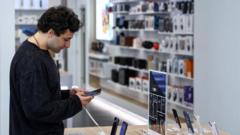Cyber-security is attracting professionals from diverse backgrounds, offering opportunities for career changers to leverage their unique skills in a growing industry. The sector is experiencing a significant workforce shortage, with ISC2 estimating that four million more cyber-security professionals are needed worldwide.
Dr. Leila Powell, a former astrophysicist, exemplifies this career transition. In 2015, she moved from studying galaxies to cyber-security, seeking a career that could more directly impact people’s daily lives. Now a lead security data scientist at Panaseer, she brings a fresh perspective to data analysis, noting that her different background allows her to see insights others might miss.
According to ISC2, 39% of new cyber-security employees come from non-IT roles. The industry values transferable skills beyond technical expertise. Amanda Finch from the Chartered Institute of Information Security (CIISec) emphasizes that communication, analytical, and problem-solving skills are often more critical than technical knowledge.
The career transition can be financially rewarding. A Cybershark Recruitment survey found that professionals with one to three years of experience can earn between £39,500 and £58,000 in roles like digital forensics and threat intelligence.
Calum Baird, a digital forensics and incident response consultant, transitioned from a decade-long career in policing. His background taught him crucial skills like risk assessment, communication, and adaptability. He highlights the importance of continuous learning in cyber-security, given the rapidly evolving technological landscape.
Rebecca Taylor’s journey is another testament to the industry’s diversity. Starting as a personal assistant at Secureworks, she gradually moved into threat intelligence. Her humanities background in English and creative writing proved valuable in processing and communicating complex information.
Experts recommend that organizations looking to fill cyber-security roles should:
– Break down job roles into specific duties
– Identify associated skills
– Look for transferable skills from other industries
– Consider candidates with strong analytical and communication abilities
The perception that cyber-security is purely technical is changing. As Taylor notes, “There’s so much more to cyber than technical” skills. The industry welcomes professionals from various backgrounds who can bring unique perspectives and skills.
Dr. Powell encourages potential career changers to explore opportunities, stating, “If I hadn’t seen that advert, it would never have crossed my mind that cyber-security could be an industry I could get into.”
With a growing demand for cyber-security professionals and an increasing recognition of diverse skill sets, the industry offers an exciting career path for those willing to learn and adapt. The key is not just technical prowess, but the ability to think critically, communicate effectively, and continuously develop new skills.




